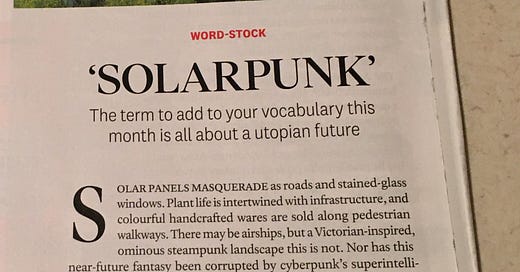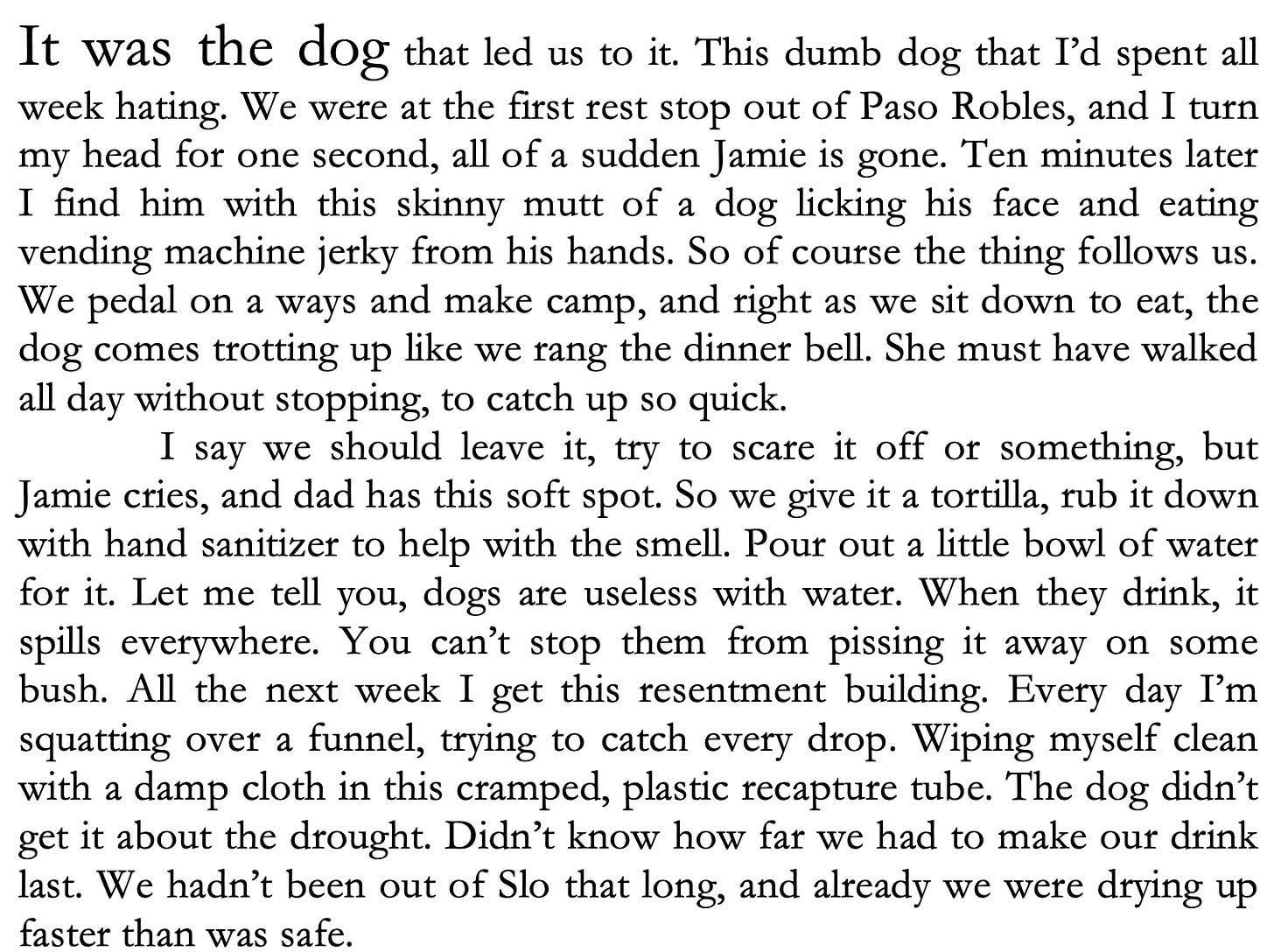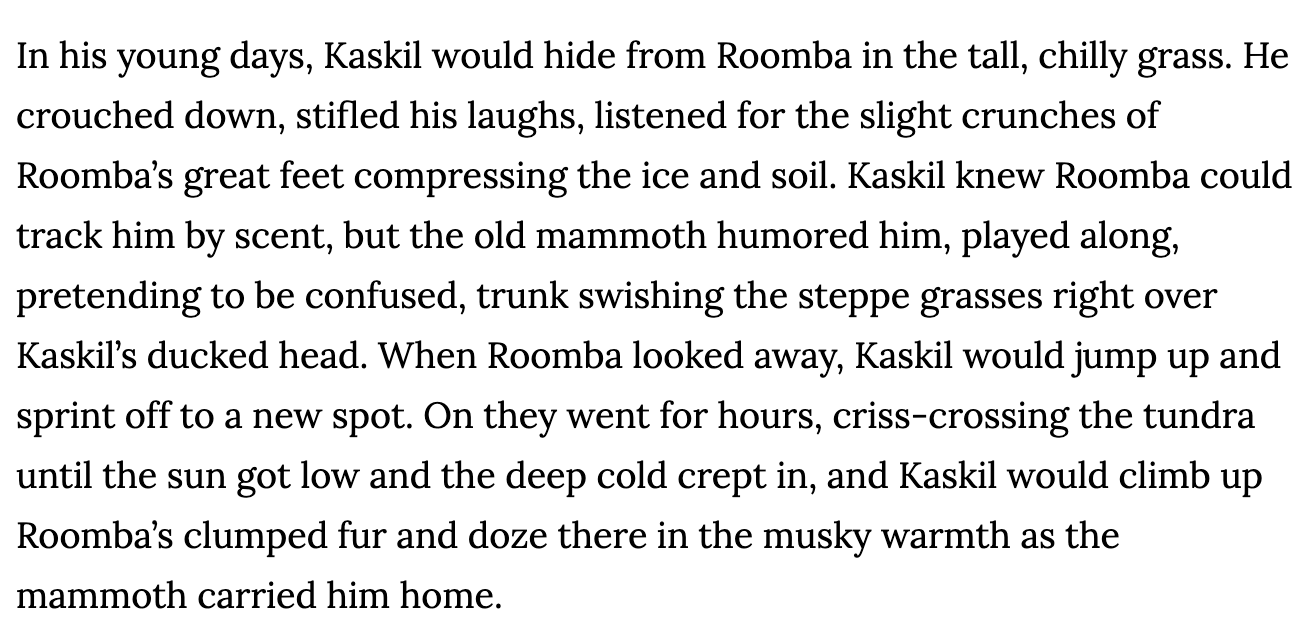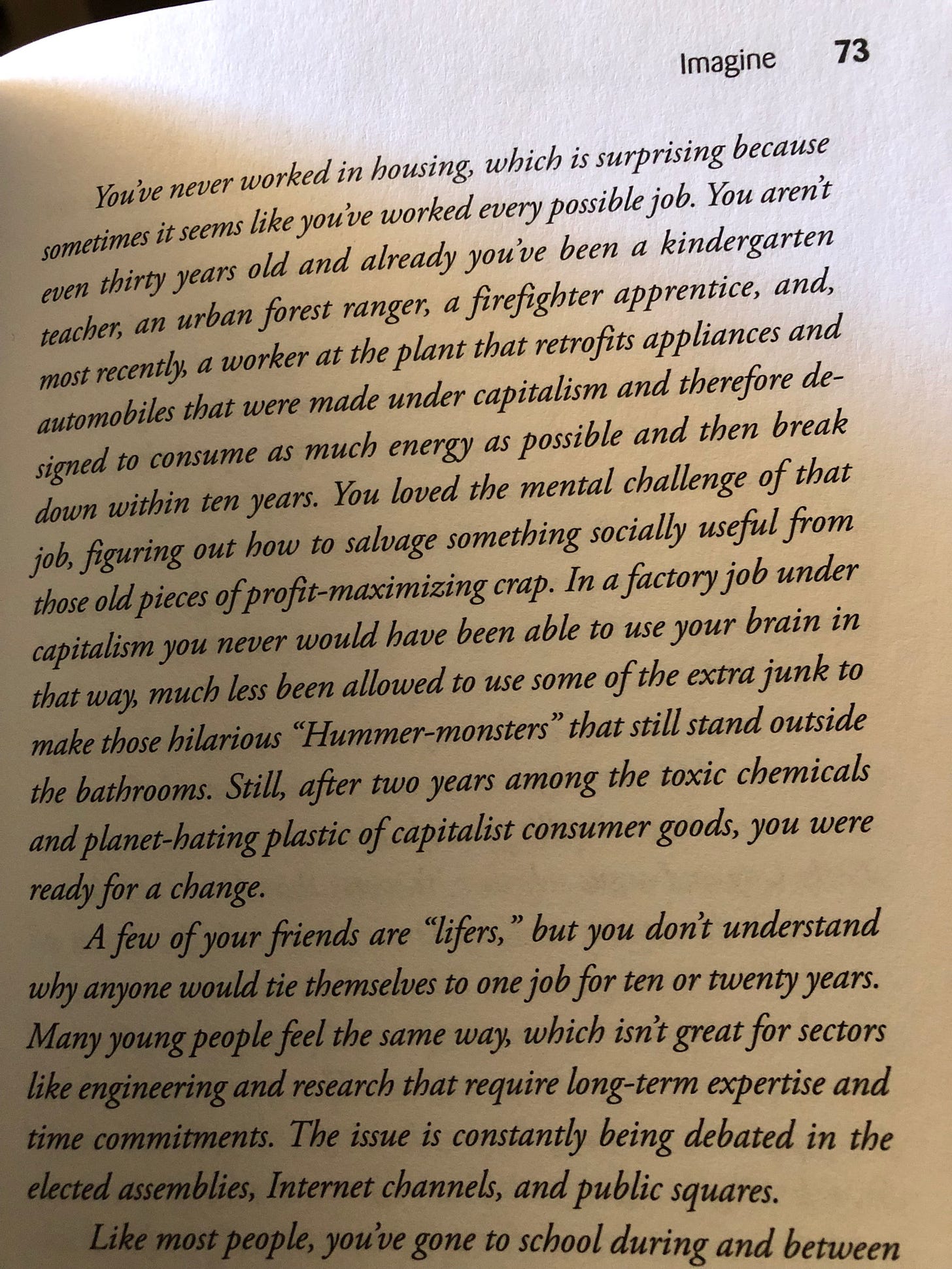Issue number two, which means I’ve now experienced the full cycle of newsletter emotions, from relief at getting out the last edition to fresh anxiety at the new deadline looming. We’ll see if I get wise and start piecing the sections together ahead of time. For now, I’m blocking off a Saturday to hammer the full newsletter out from scratch.
I’m still experimenting with what sections to include in this thing, and I’ll probably keep changing it up. I came perilously close to writing an “Amusements” section detailing my recent evening at the Arizona State Fair. But really, what is there to say? It’s a state fair: nothing but innocent, low-brow decadence that’s hard to get mad at, despite all the twisted and unsustainable systems holding it up. Could I have an extended take on it? Sure. But would doing so really help me or anyone else? Would I break any ground not already turned up every generation by the likes of Hunter S. Thompson or the Chapo Trap House boys? Nah.
That said, lukewarm takes still have their place:

My key strategy for making sense of any speculative situation——be it the fiction I’m writing or the future I’m expecting to live through——is to imagine what people will be arguing about. As social change unfolds and material conditions shift, so too do the terms of debate, the norms of discourse, the Overton windows of possibility, the ideas people find interesting, and the pressing collective decisions that need to be cleaved one way or the other. We create a surplus (of food or labor power or electrons), then we have to decide what to do with it. We hit a bottleneck, so we prioritize. We suffer a disaster, and we triage. We can imagine fixing all of our most wicked problems, and still we would face individual and collective choices about how we should live and treat each other.
Thanks for being here. If you enjoy this newsletter, my lines and DMs are open. I’m always looking for feedback and often interested in collaborations. You can also hire me to do editing, boutique fiction, narrative strategy, etc. And if you found your way here from social media or elsewhere, consider subscribing with the button below.
Press Clippings
This month I’ve had (or at least noticed) a couple of quotes in articles, the product of conversations I had back in the summer.
Scroll——a pretty big digital news publication based in India——had a nice piece about solarpunk and the Multispecies Cities anthology that came out earlier this year, which reprinted my story “The Mammoth Steps.” I, along with a few other included authors, answered questions about our stories, and everyone’s thoughts are definitely worth a read. For my bit, I talked briefly about how I came to my current multispecies thinking:
Once I [stopped eating meat], however, a whole vast landscape of moral thinking opened up to me. I no longer needed to dull my horror at how we treat animals to justify my own behaviour. I was soon able to see non-human animals as subjects instead of objects, as beings with their own feelings, experiences, opinions, preferences, and inner lives.
But I also realised that even when we think of other species as subjects deserving of justice, our ideas about just multispecies connections felt anemic at best. Mostly they amounted to “leave animals alone.” Few people were talking about sharing our civilisation with other species. I wondered if, with a little negotiation, some species might be just as good as humans at peacefully sharing urban space and contributing to society.
Plus I got to call apolitical fiction “bourgeois nonsense made popular by the CIA.” So, something for everyone.
Another interview I did this summer made it into the Canadian magazine Maclean’s, in a short “word of the month” piece about solarpunk. Somehow I had missed this when it came out in August——Google Alerts only get you so far when you have a common first and last name. It was brought to my attention by my copy editor on Our Shared Storm, who happened to come across it after we finalized my manuscript. Here’s the photo she sent me of the piece in print:
Anyway, plenty of coverage lately of solarpunk slime-mold-creeping its way into mainstream awareness. I’m always happy to give my perspective for these kinds of pieces, but I don’t read them all anymore. It’s a big town now, with too many people to police and too many diverse projects to define a precise bucket for. So for now I just try to do my stories and occasionally chuck ideas into the pond to see what gets churned up.
Works in Process
The Remainder —— Been making semi-steady progress on my Covid-Leftovers-X-files novel, mostly in the form of good writing days where I manage to piece together 1-2k words, a few times a week. I know some authors pound out two or even ten thousand words a day, but that’s never been me. I figure a lot out as I go, and I fiddle a lot until I get things sounding right. Compared to other writers, I suspect I spend more time writing first drafts and less time rewriting/editing. Hours-wise it’s probably a wash. More important, with either strat, is consistency and persistence, as every writer tells you.
The upshot is that the novel is flowing but I’m likely to miss my self-imposed end-of-October deadline. I’ve been saying “I’ll just pound out the end of Remainder” since at least the beginning of summer. Turns out novels are just much longer than short stories! Who knew? I keep churning out pages that the book needs, but there keeps being more book to write. If I could do 1-2k every day, I might get there, but I’ve got other projects in the mix and anyway brains need breaks. So I’m slowly resigning myself to letting this sprawl into November, where it will jostle around with some of the short fiction projects I’ve been planning to take up. Still, the end is in sight, which is exciting.
I got through a few chapters of the drugs+capitalism book I’ve been hired to edit. Really good stuff, and a potent reminder that almost every crop and commodity we now enjoy had a wild, often grotesque ride to globalized ubiquity. I’m taking a lot of side notes for my backburnered alt-history socialist detective novel. Realizing it’s not enough to imagine more equitable distribution and happier workplaces——a positive revolution in our political-economy a century ago would mean a total reshuffling of the products that fill our lives, a deep change in the texture and flavor and mouthfeel of our material reality.
A couple of days ago I drew up a grant proposal with my friends Robert Kirsch and Emily Ray for a transdisciplinary project on doomsday bunkers and the “bunkerization” of American politics. They’ve already done a bunch of research and writing on this topic, and our plans include a digital archive of old-timey bunker adverts they’ve found in survivalist trade mags. We may put out a zine of this stuff printed by our own Holum Press. And I’m hoping to be able to build on their work with some short fiction. Whatever I come up with will probably feed into the next near-future cli-fi book slowly taking shape in my brain, filed under the title Nights of Paper, Days of Glass. Got to get the grant first, of course, but always good to have these sorts of projects in the works.
ICYMI
“The Motherlode” —— speaking of bunkers, the grant proposal had me revisiting this story I wrote back in 2016. It was part of a project/short book called The Games That Got Us Through, which I produced (in collaboration with Adam Flynn and J. Bryce Hidysmith, with help from several others) as part of ASU’s Emerge Festival that year. The theme that year was the future of sports, and “The Motherlode” (the first story in the book) was the backstory for a rugby/tag-style sport we invented called Cistern, which we imagined might emerge out of a megadrought-driven American climate migration. The story itself is about an Arizonan refugee family happening upon a survivalist bunker, complete with a dead survivalist. Like a lot of the stories I wrote when I was first finding my feet as a speculative fiction writer, this remains a favorite of mine. Here’s the opening bit:
“The Mammoth Steps” —— Mentioned above, so figured I’d share. I wrote this during an overnight visit to Arcosanti a few years ago, and it was quickly snapped up by Terraform. This year it was reprinted in Multispecies Cities with an expanded ending that you’ll just have to buy the anthology to read. In the meantime, here’s the beginning:
You can read more of my work via my website. If you’re a fan of the above, consider preordering my next book, Our Shared Storm: A Novel of Five Climate Futures, coming April 2022.
Research Notes
The other day, friend and spec-fic great Malka Older tweeted a great, short thread reckoning with one of the hardest questions about getting to that green and elegant sustainable future: what do we do with all our half-broken crap? Especially our machines, especially the millions of gas cars we ridiculously produce every year. I was reminded of the below page from Danny Katch’s book Socialism…Seriously:
It’s from a lovely fictional section in the middle of the book that imagines “a bad day under socialism.” The whole vignette is one of my favorite descriptions of the contours of modern life under a very different set of economic and political circumstances——and doesn’t fail to include the lively debates still going on. I come back to it constantly.
Material Reality
It finally got cold here. Like, wear a sweatshirt outside all day cold. Yesterday still got up to 90F, but overall it’s a big shift, especially compared to this time last year.
I’m looking forward to long winter writing days on my patio, but at the moment the mosquitos still chase me inside if it isn’t chilly and/or windy enough. There’s a park down the block, and the city does flood irrigation to keep the grass green through the summer. Technically this saves water, but it also provides a weekly breeding ground for mosquitos. While I mostly don’t itch or welt up when I get bit, there’s been a huge spike in West Nile deaths in our county. Our own little dose of the deadly indoors/deadly outdoors combo that California pioneered last year. So, I’m trying to be careful.
Now that outside is comfortable for most of the day, I’m getting a whole different experience of my neighborhood. We’re all little Stardew Valley NPCs, with schedules that change with the weather and the seasons. This week I was doing edits in my hammock when a neighbor came down the alley and said hi. We’ve talked plenty before, but it had been a few months since we’d seen each other. She’s lived here for thirty years and makes occasional rounds through the alleys, gathering weeds to feed her hens. We talked garden plans and water hoarding——around here you never know who’s gonna be obsessed with Lake Mead levels. Then she gave me an updated tour of her lush and shady backyard, introducing me to her molting chickens and her volunteer fruit trees, and the soil and coolness they cooperate to create.
All of which threaded in with conversations C and I have had recently about where, geographically, we want to be in five years. As comfy as we are in our current rental, being limited by our landlord in what we can do to the property is starting to drag. Rooftop solar, more extensive gardening, chickens——all investments that make a lot of sense given the likely future of electrification, supply chain breakdown, crop failure, general social and political precarity. We’re getting old enough that we really would like some of that “infrastructure as a form of resistance.”
So we’re starting to think seriously about how we can maneuver ourselves into some sort of retrosuburbia multi-family housing situation. Somewhere we can “dig in” a bit, try our hand at amateur permaculture, collectivize risk and responsibility with a knot of like-minded people. The intellectual and legal groundwork has already been laid, so it’s just a matter of molding this vision to the particulars of our own lives. Like a lot of older millennials (though not geriatric, ffs), we don’t have much capital, but this feels doable if we can find the right people and the right place. I suspect many in our cohort will be thinking the same way as the paralysis of the pandemic ebbs.
For now we have six months of really beautiful weather to look forward to. There’s an amnesia that sets in around this time. Everyone is like “oh yeah, now I remember why I live here,” and we get suckered in for another year. We bathe in the cooling River Lethe, to wash away the nightmares of the summer’s boiling air.







